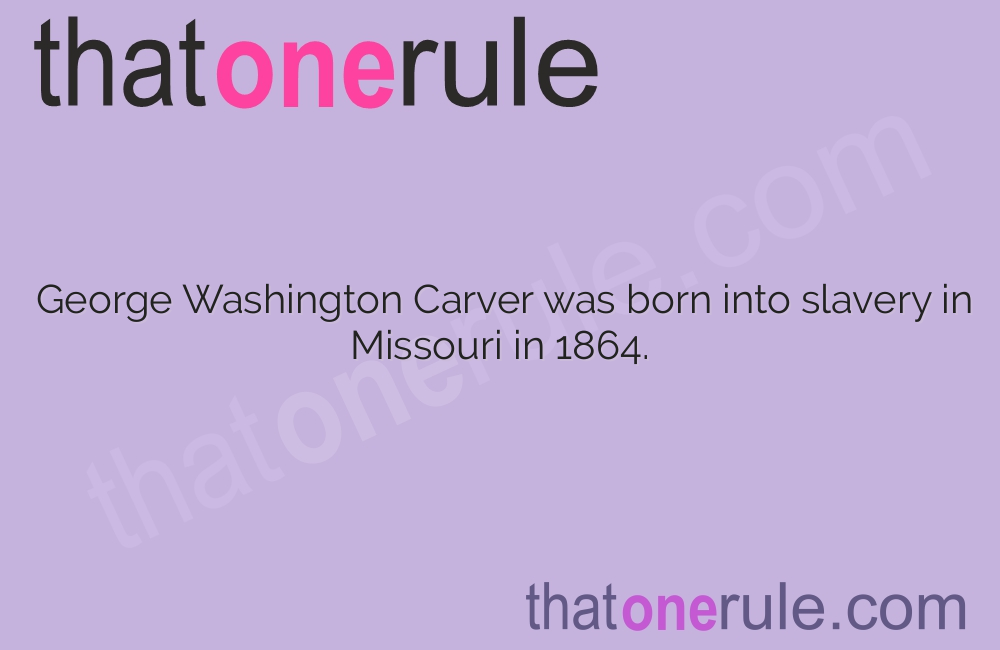Discovering the Fascinating Trivia of George Washington Carver

George Washington Carver was born into slavery in Missouri in 1864.
Carver was the first African American student at Iowa State University.
He was known as the Plant Doctor because of his expertise in agriculture.
Carver developed more than 300 products from peanuts including peanut butter, oil, and milk.
He also invented over 100 products from sweet potatoes including flour, vinegar, and ink.
Carver taught farmers in the South how to rotate crops to restore soil fertility.
He was a strong advocate for sustainable farming methods.
Carver had a remarkable memory and could quote Bible verses and poetry from memory.
Despite facing many obstacles, Carver was determined to continue his education.
He was the first African American faculty member at the Tuskegee Institute in Alabama.
Carver encouraged farmers to grow alternative crops to cotton, which helped diversify the agricultural industry.
He developed a technique to make synthetic marble from clay and vegetable dyes.
Carver’s work with agricultural research helped farmers increase their income and become self-sufficient.
He gave lectures and demonstrations to farmers across the country to promote innovative farming practices.
Carver was invited to speak at the World’s Fair in St. Louis in 1904.
He was a highly respected scientist and received honorary degrees from several universities.
Carver was passionate about conserving natural resources and preserving the environment.
Discovering the Fascinating Trivia of George Washington Carver part 2
He believed in the power of education and encouraged others to pursue their dreams.
Carver was often mistaken for Booker T. Washington, another influential African American figure of the time.
He was an inventor, botanist, and teacher, but also had a talent for painting and music.
Carver’s humble upbringing taught him to value hard work and perseverance.
He was known for his gentle and kind nature, always willing to help others.
Carver worked tirelessly to improve the lives of African American farmers in the South.
He received numerous awards for his contributions to agriculture and science.
Carver’s innovative farming methods continue to be used today to promote sustainable agriculture.
He believed that every person, regardless of their background, had the potential to make a difference.
Carver never married or had children, dedicating his life to his work and helping others.
He actively promoted the use of composting and organic fertilizers in farming.
Carver’s research on crop rotation helped prevent the spread of diseases and pests in crops.
He encouraged the use of cover crops to protect and enrich the soil.
Carver was known for his experiments in grafting and hybridizing plants.
He was awarded the Spingarn Medal by the NAACP for his contributions to the African American community.
Carver’s legacy lives on through the George Washington Carver National Monument in Missouri.
He believed in the importance of scientific experimentation and observation.
Carver’s work with peanuts and sweet potatoes helped create alternative food sources during times of scarcity.
He was a voracious reader and constantly sought knowledge in various disciplines.
Carver’s research on the uses of peanuts and sweet potatoes helped farmers diversify their income.
He was devoted to improving the quality of life for rural communities.
Carver’s innovative thinking and problem-solving skills made him a highly sought-after consultant.
He believed in the importance of self-sufficiency and developed methods to help farmers achieve it.
Carver’s scientific discoveries revolutionized the agricultural industry.
He faced discrimination and racism throughout his life but remained steadfast in his pursuit of knowledge.
Carver’s work helped improve food security for many communities.
He was a trailblazer for African Americans in the field of agriculture.
Carver’s legacy continues to inspire and educate future generations about the importance of sustainable farming.

